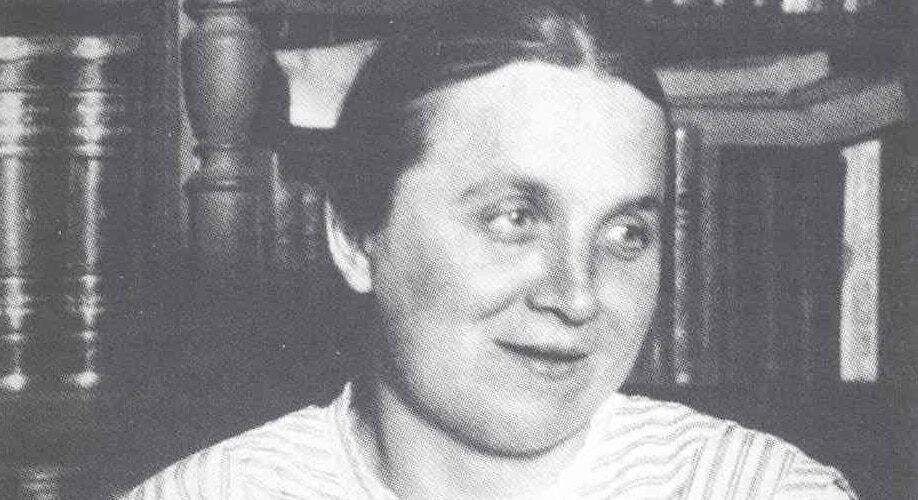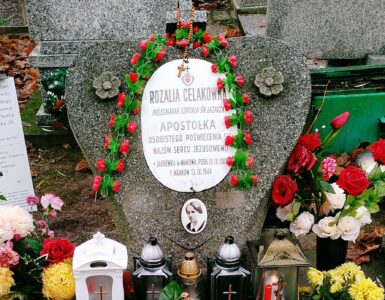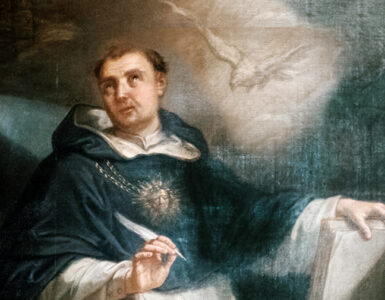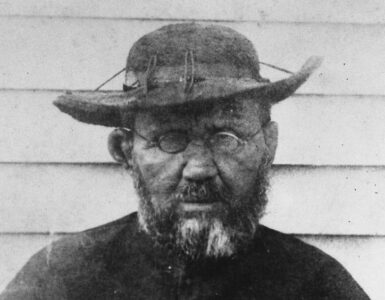Throughout the Church’s history there have been many visionaries and mystics who have undergone intense spiritual experiences. One of the most amazing was a German woman named Therese Neumann, who lived in the 20th century. She had numerous visions of scenes from the life of Christ, along with hearing heavenly voices and seeing apparitions of the saints. For thirty-six years, until her death in 1962, Therese bore the stigmata—the wounds of Christ—on her hands, feet, and side. She was bedridden for many years, and during this time physically relived the Passion of Christ hundreds of times, with bloody wounds and scourging marks on her body. Each time she clinically died at 3pm on Friday; her heart stopped beating and all vital life signs disappeared— only to resume a short time later (Michael Freze, S.F.O, Voices, Visions and Apparitions, p. 73). On one occasion her frightening experience in this regard saved her from arrest. Almost everyone who visited Therese knew she despised Adolf Hitler and the Nazis, and in 1940—when he was at the height of his power—she foretold his downfall. Word of this reached the Gestapo, the Nazi secret police, and two agents came to arrest her while she was undergoing one of her Friday experiences of the Passion. Somehow knowing they were approaching, Therese miraculously sprang from her bed, ran downstairs, and opened the door as they were about to ring the doorbell. Seeing her covered with blood from all the wounds of Our Lord’s Passion, the two Gestapo agents were so frightened they turned and walked away as fast as they could, and Therese was never again bothered by the authorities (Thomas W. Petrisko, The Fatima Prophecies, pp. 51-52).
Hundreds of bishops, priests, and laypeople visited Therese and witnessed her experiences firsthand—including the fact that for twenty years, she took no food or drink, and had no nourishment other than the Eucharist. Some doctors, scientists, and even a few clergy were convinced this was a hoax, and on one occasion she was examined under the strictest possible circumstances for fifteen days; to rule out any possibility of deception, she was never alone for an instant. During that time, she took absolutely no nourishment, except for the Eucharist, and a tiny sip of water to help her swallow. Afterwards the observers verified that her health and her weight were the same as before. When asked by some priests to explain all this, Therese declared, “The Savior sustains me. He said, ‘My Body is food indeed,’ so why shouldn’t it be actually true . . . if He wills it?’” (The Story of Therese Neumann, Albert Paul Schimberg, pp. 54ff, 61).
In addition to Therese Neumann, a number of saints have fasted for many years from all nourishment except for the Eucharist, including St. Catherine of Siena, St. Nicholas of Flue, and St. Gemma Galgani (Mysteries, Marvels, and Miracles In the Lives of the Saints, Joan Carroll Cruz, pp. 248ff). It seems God allows miracles like this to occur as a way of verifying the words of His Son that He is indeed the true Bread from Heaven, and that those who worthily receive Him are fully alive. Despite this great Gift, it’s easy for us to take Holy Communion for granted. Instead of this happening, we, as Catholics, are invited to let the Eucharist nourish us, sustain us, and truly make a difference in our lives.
Jesus states very clearly in the Gospel of John (6:41-51) that He is the Living Bread from Heaven, and that those who eat this Bread will live forever. Just as the prophet Elijah was unable to complete his long journey without taking the nourishment miraculously provided by God, so we cannot hope to endure our pilgrimage through life, and safely reach our heavenly home, without relying on the strength given us by the Lord. Jesus instituted the Eucharist at the Last Supper not only as a sign of His love, but because He knew we would need His life within us in order to remain faithful to Him and continue growing in holiness.
When Our Lord says that those who eat His heavenly Bread will live forever, He obviously means the Eucharist will prepare us for eternal life in Heaven. However, if we receive Holy Communion worthily, there are some things that should be happening within us here and now, during our earthly lives. First of all, the Eucharist should make us more grateful—not only for the Sacrament itself, but for all God’s blessings. To receive the actual Body and Blood of our Savior is an unmerited privilege—one not granted to all the holy people who lived before the time of Christ, and one not granted to several billion non-Catholics today, some of whom are undoubtedly holier or more deserving than we are. We should be profoundly thankful to the Lord—and the moments after receiving Communion are the best time to speak to Him in our hearts, expressing our gratitude. Secondly, receiving the Eucharist should make us more humble. Jesus Christ, the eternal Word of God through Whom all things were created, humbles Himself by coming to us in this Sacrament—so we in turn should receive Him with the utmost reverence and humility, and only while in a state of grace. Among other things, being humble means staying until the end of Mass, trying to remain conscious of the Lord’s presence throughout the rest of the day, and acting only in a way pleasing to Him. Lastly, our spiritual union with Jesus through the Eucharist should be accepted and shared by recognizing and respecting our unity with the people around us. Jesus didn’t come into the world to save only Catholics, and the privilege given to us of receiving Him in Holy Communion doesn’t mean we’re better than everyone else, or that His grace is to be kept to ourselves. The spiritual nourishment we receive here at Mass each weekend is meant to empower us to witness to and live out the Gospel the rest of the week, in the hope that our example will attract others to Christ, helping them choose to become His disciples, too. The more we are truly alive by means of the Eucharist, the more we will want everyone else to know and experience this new life, as well.
It isn’t necessary for us to undergo mystical experiences, as did various saints and persons like Therese Neumann, in order for the Eucharist to make a real difference in our lives. Jesus simply asks us to be open to His grace, humble in His sight, and generous in sharing His love. If we are, His grace, by means of this great Sacrament, will truly be at work within us, strengthening us, renewing us, and preparing us for the joys of eternity. Our Lord loves us far more than we can imagine, and worthily receiving Him in a spirit of humility and gratitude is the response He desires from us more than anything else.






























